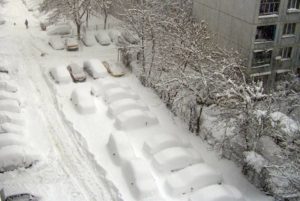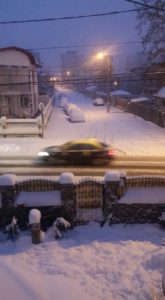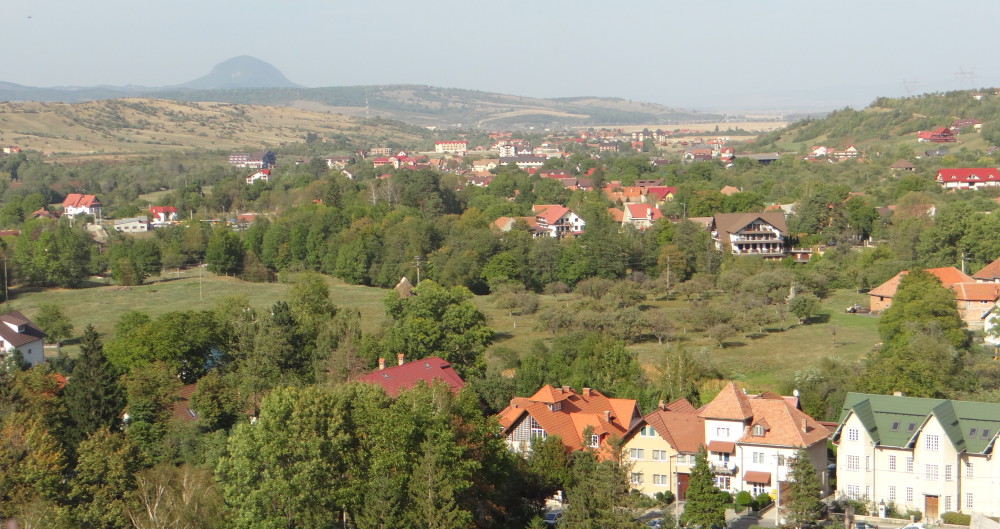 Photo: Florentina A. 2017
Photo: Florentina A. 2017
The first snow of 2017 finally arrived; a couple of inches covered the ground early before sunrise, turning our world into a powdery-white winter wonderland. The woods were unusually quiet and the animals disappeared with the exception of the resident fox. She ran from the back bushes and left a trail of swirling dry snow disturbed by her bushy tail. My two squirrels were nowhere to be seen.
I was planning to go to an Epiphany celebration that morning and was not sure if I could drive on unplowed roads in our neighborhood. The main highways were clear; this time nothing was left to chance, plows and salt trucks were in position the night before. They were not going to repeat last year’s fiasco when a few inches of snow on untreated roads caused gridlock on all major highways and interstates for hours in northern Virginia. I was stuck on a hill top with many others for six hours before we were rescued.
I made it to my friend’s beautiful mansion, perched on the top of a hill and I parked on an incline without fear. The snow had stopped, how hard would it be to maneuver the car going home?
An hour and a half later, I did not like what I saw. The snow was coming down hard again, covering everything with a fresh, thick blanket. As I looked out the window in the back yard at Denise’s two pink flamingos covered in inches of snow, my mind wondered to my childhood’s snow, a world away on the other side of the globe, in another time, another life, not so abundant as today.
Our winters were always very heavy, icy, and bitter cold. When it snowed, we stayed snowed in for months in the country unless God was merciful and temperatures rose for a few days. Then it snowed again on top of ice. The city plowed the main roads for buses and trams, but side streets were always buried deeply. The main streets had snow piled up so high on the sides; we could not see the heads of the people walking between the mountains of snow. Boulevards and avenues were covered in dirty slush, splashed with vengeance onto everything.
I am not sure how much the many falls on sheer ice have affected the intense pain I have today, I just remember the constant bruises on my legs and butt. I was fortunate to have never broken a bone, but many of my friends were not so lucky.
To us kids, winter was a time of fun, sledding, building snow men, snow ball fights, and ice skating, but for adults it was a time of misery – walking, commuting, and working in bitter cold. For the elites, who had chauffeurs and their own cars, it was a time of skiing and partying in the beautiful mountainous lodges and expensive hotels of beautiful Sinaia resort.
Growing up with my grandparents in the country, snow was something entirely different than in the city. It created a lot of extra chores in order to survive. Nobody came to plow the roads and the bus arrived often only once a day if it did not get stuck on the way. Once in the village, even though it was only six miles away from the city, you were stuck for the winter.
We had to care for animals every day, feed them, water them, and make sure they did not freeze to death. My grandparents’ four bedroom house did not have heat, nor a bathroom, so they built a tiny adobe, mud and straw brick, three-room structure nearby and that is where we survived in winter.
The first room was where we cooked the meals on the cast iron stove which was fed with chopped wood and sent heat to the adjoining room where Grandma Elena and I slept. Grandpa Cristache’s bed was not far from the stove and as such, he got up every morning and restarted the fire which had died during the night. We did not freeze because we had really thick and heavy wool quilted comforters stuffed with cotton which kept us toasty warm. As soon as we stepped out of bed, it was very cold.
A third room had a separate entrance and was used as a summer kitchen and that is where we ate our meals as well. It was warmed by a butane gas stove on which grandma cooked our meals and the slop for the pig.
The wooden outhouse was located in the garden, as far away from the house as possible, and we had to trek through mud and snow to use it. It was just a wood shack over a hole in the ground. The toilet paper was pages from the main communist newspaper, Scinteia (the spark), with Ceausescu’s brain-numbing lying speeches. It gave adults a sort of perverse and guilty pleasure to use his printed face on our behinds.
Grandma felt sorry for me, a “city girl,” where we had indoor plumbing and a bathroom. But I spent more time with them growing up and on school vacations than in the city. Besides, the commies did not give us hot water often in winter and in summer they even cut off cold water in order to clean and maintain their holding containers of rust and minerals or to conserve resources. So Grandma brought in a bucket at night so I did not have to go to the outhouse to pee; she did not want me to trip in the dark and fall on ice or snow.
At night, she gave me a clean and warm flannel pajama, painfully washed by her ageing hands and dried on the line, clean but smelling like wet dog. We slept cozy warm until the fire in the stove died out and the crackling of burning wood stopped. As soon as we hit the sack, flees woke up and started biting but we were too tired and cold to care. Grandma always fed many flee-infested cats that slept in the attic, in hope that they would control the mouse population. We could hear the mice at night running through the tunnels they dug inside the adobe walls, probably going up to where hay and grain was stored. When we got up in the morning, bleary eyed and shivering, we waited for Grandpa to stoke the fire again before we crawled out of bed. Our pajamas and nightgowns bore bloody witnesses to the many flea bites we got during the night. Grandma tried to treat the cats with a flea powder, probably DDT, but fleas became hardy, they always came back.
Every morning we had to boil water to start the frozen pump outside which gave us water. It would freeze so hard, we had to boil a couple of pots before we could break the ice and start pumping water again for our own use and for the animals.
I remember thinking that I never wanted to be a farm girl, to live in the country, because life was too harsh, frigid, and miserable. And there were so many chores that a child like me could not understand. Life was hard, no radio, no TV, and no electricity, we used a kerosene lamp with a wick and a fluted clear glass globe.
I can never understand to this day how my Grandfather bicycled to work nine kilometers each way in heavy snow for four decades. He was in good health but, when he developed a hernia and needed an operation, they nicked his colon during surgery. Ceausescu’s communist surgeons were ill prepared to care for the proletariat and nobody was concerned when most of them either died on the operating table or later from infection from a botched procedure. When I was seventeen, my beloved Grandpa, who taught me so much history, told me so many stories, and guided my first seven formative years of my life, died a horrible death from gangrene.
Village kids seldom had time to have fun in the snow – there were too many chores. But once in a while, around the holidays, they went from door to door, pulling a sleigh in the snow, decorated with a pine tree with colorful crepe paper garlands, singing about Father Frost and wishing the residents health and happiness in the New Year.
The snow turned red at Christmas with the blood of slaughtered pigs, a generational tradition passed for centuries. We were not allowed to eat meat unless we watched the animal being killed. I always hated that because domesticated animals were my pets. As I watered and fed them, I talked to them as if they were human and petted them. They responded in kind with affection, following me around the yard.
And here I am today, in this beautiful home, surrounded by freshly fallen powdery snow, so far away from where I came, wishing once more that I could travel back in time to my childhood snow, my grandparents, and my roots.
 Photo: Florentina A. 2017
Photo: Florentina A. 2017
I regretfully left, struggling to control the car in the driving snow, and, when I got home, my cousin had sent some photos of the snow they got in my hometown of Ploiesti. It was just as I had remembered it. I gazed through teary eyes at the image of roads and fenced yards totally submerged by un-shoveled tall and pristine snow and I wished that I was an oblivious and blissful child again.
ILEANA JOHNSON
American By Choice
